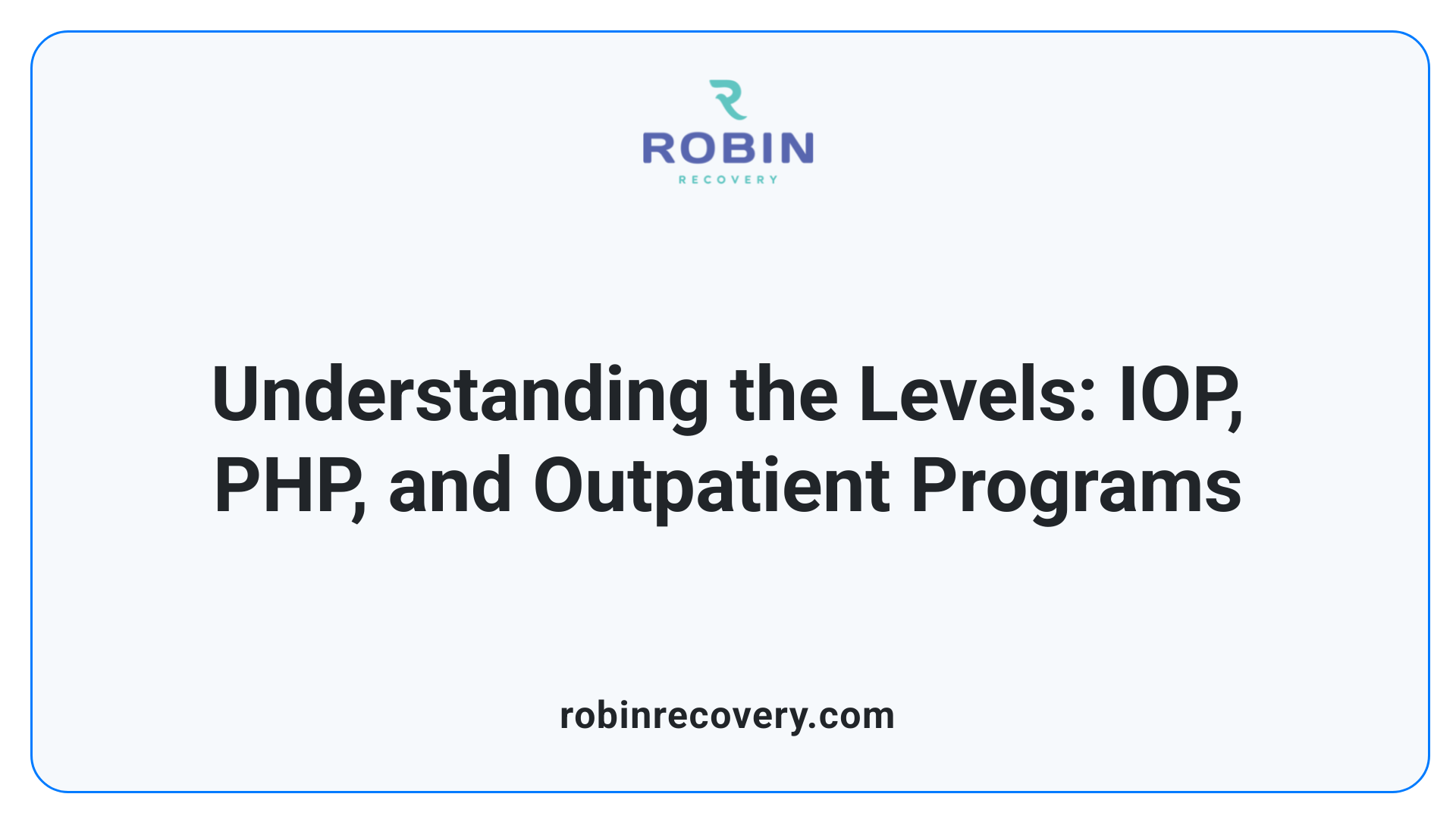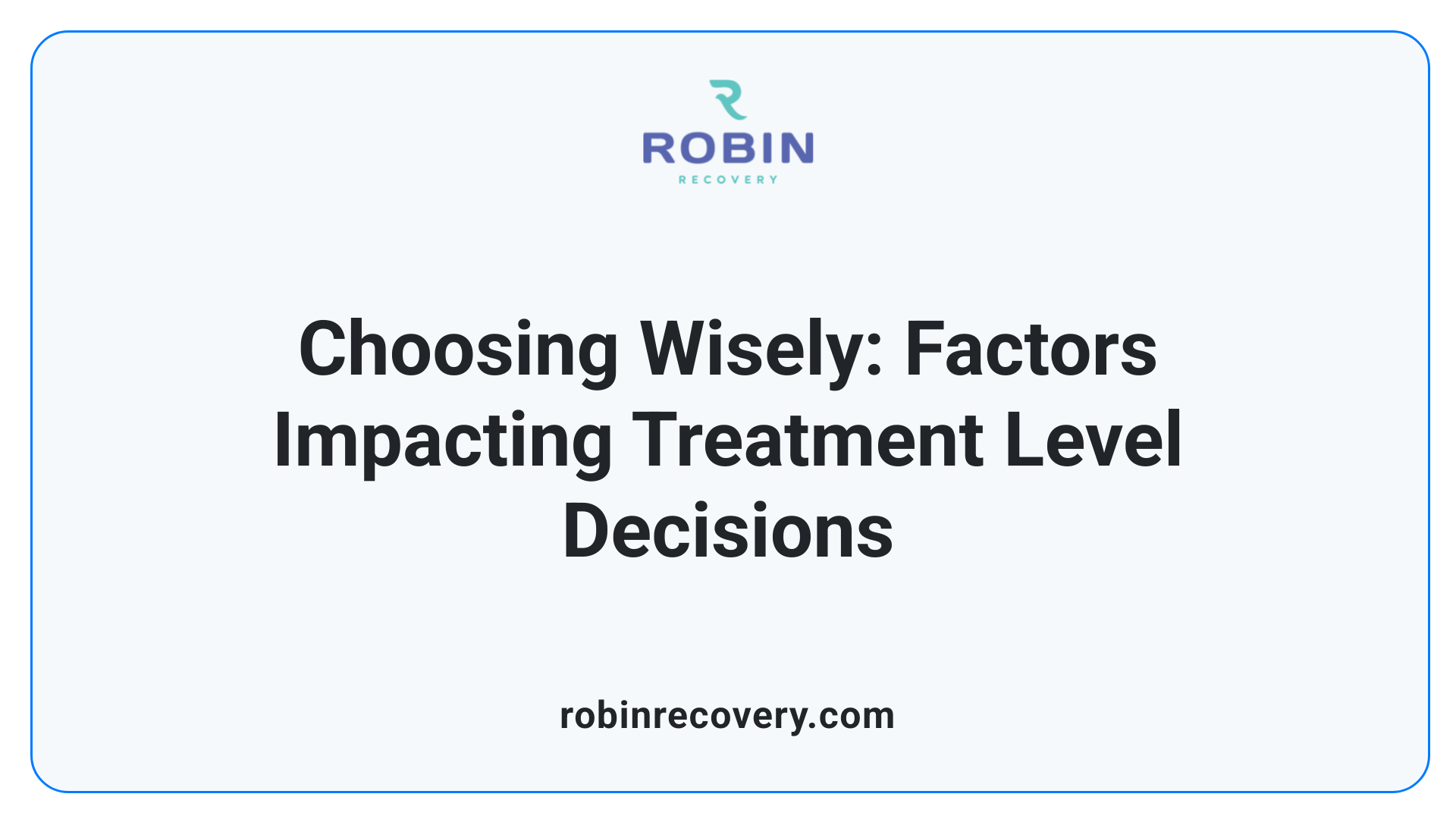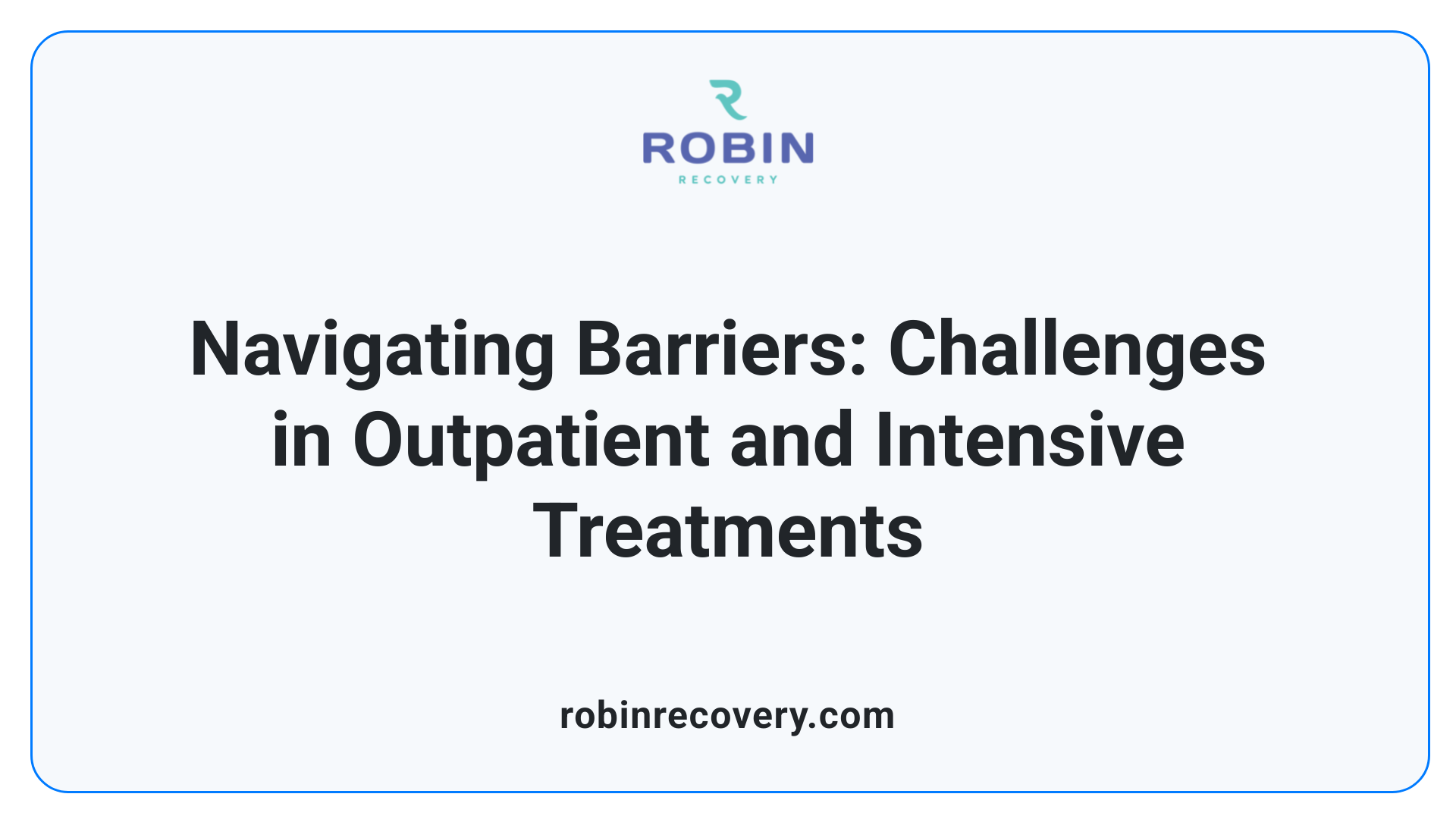How to Choose Between IOP, PHP, and Outpatient Programs

Understanding Your Treatment Choices: IOP, PHP, and Outpatient Care
Choosing the right level of care for mental health and substance use treatment can be complex. With options like Intensive Outpatient Programs (IOP), Partial Hospitalization Programs (PHP), and traditional outpatient services, understanding their differences, benefits, and suitability is essential for making an informed decision. This guide explores the key features of each program, factors to consider when selecting a treatment plan, and how to determine which option aligns best with individual needs.
Differences in Program Intensity and Structure

What are the key differences between IOP, PHP, and outpatient treatment programs?
Intensive Outpatient Programs (IOP), Partial Hospitalization Programs (PHP), and outpatient treatments vary significantly in their level of support and daily structure. IOPs generally consist of therapy sessions lasting a few hours, three to five times a week, designed for individuals who need structured treatment but can continue their daily routines such as work or school. PHPs involve more comprehensive support — participants attend therapy five days a week, with each session lasting about six hours, often including medication management and medical oversight. They serve as a transitional step from inpatient hospitalization or as a treatment for more severe conditions requiring intensive oversight.
Outpatient programs are less intensive, involving fewer sessions often scheduled weekly or bi-weekly. These are suitable for those with mild symptoms or as long-term maintenance after more intensive treatment. The primary difference lies in the hours committed per week and the level of supervision, with PHPs being the most intensive and outpatient programs offering maximum flexibility.
How do IOP, PHP, and outpatient programs compare in terms of benefits and features?
Each program offers distinct advantages tailored to participant needs.
Program Typical Hours per Week Structure Support Level Suitable For IOP 9-12 hours Sessions 3-5 days/week, shorter daily hours Moderate, focus on relapse prevention and skill-building Individuals with mild to moderate symptoms, those transitioning from inpatient or PHP PHP 20-30 hours Sessions 5-7 days/week, full-day structured care High, includes medical monitoring, medication management, family counseling Moderate to severe symptoms, stabilization needs, step-down from inpatient Outpatient 1-4 hours 1-2 sessions per week, flexible scheduling Low, outpatient basis Mild symptoms, ongoing relapse prevention, long-term support
This table illustrates the differences in hours, structure, and support, emphasizing how each caters to different levels of need.
Duration and hours of therapy per week
Typically, IOPs are designed to be completed within 8 to 12 weeks but can vary based on individual progress. They involve roughly 9 to 12 hours of therapy weekly, distributed over several days.
PHPs usually span shorter durations, often around 4 to 8 weeks, with sessions totaling about 20 to 30 hours weekly. The intensive schedule helps in stabilization and rapid progress.
Outpatient programs are usually ongoing or long-term commitments, with sessions that last a few hours per week, accommodating personal schedules.
Level of medical oversight and supervision
PHPs include strong medical oversight, with on-site medication management, psychiatric evaluations, and a multidisciplinary team.
IOPs offer less medical supervision since they primarily focus on therapy. Medical oversight might include medication management if needed but is generally less involved.
Outpatient treatments may provide little to no medical supervision, focusing on counseling and psychoeducation, best suited for individuals in stable condition.
Choosing the right program hinges on assessing these aspects—intensity, supervision, and personal circumstances—and consulting with healthcare professionals to tailor the best treatment plan.
This approach ensures that individuals receive care appropriate to their needs, supporting sustainable recovery plans.
Factors Influencing Treatment Selection

What factors should be considered when choosing between IOP, PHP, and outpatient treatment programs?
Selecting the right level of care depends on multiple personal and clinical factors. The severity of the substance use or mental health condition plays a critical role. For moderate to severe cases, more intensive programs like PHP or IOP are often appropriate, while milder symptoms may be adequately managed with outpatient services.
Beyond clinical needs, personal lifestyle and responsibilities significantly influence the choice. Someone with a demanding job, schooling commitments, or family obligations may prefer the flexibility of an IOP, which typically involves shorter daily sessions and fewer days per week. Conversely, individuals requiring dedicated support and stabilization might find PHP's structured, daily schedule more suitable.
Support systems and home environment are also vital considerations. A stable living situation and a strong support network enable participation in less intensive programs like IOP. For those with unstable homes or co-occurring mental health issues, PHP provides a safer, more supervised environment.
Cost considerations and insurance coverage can affect accessibility. PHPs tend to be more expensive due to increased hours of care and medical oversight. Patients should examine their insurance plans and discuss coverage options with treatment providers.
Finally, professional assessment by healthcare providers is indispensable. Experts evaluate medical history, psychiatric conditions, social circumstances, and readiness for change. They can recommend the most appropriate treatment level, aligning clinical needs with personal circumstances.
Who is the most suitable candidate for IOP, PHP, or outpatient treatment?
Candidates for outpatient treatment generally include individuals with mild to moderate symptoms, who have stable support systems, and can maintain responsibilities outside therapy sessions. This setting is ideal for those who have completed more intensive care or are in early recovery phases.
Patients needing more structured support—such as those experiencing frequent relapses or dealing with co-occurring disorders—may benefit from IOP or PHP. PHP is often suited for individuals requiring daily therapeutic oversight, psychiatric evaluations, and medication management, particularly when stabilization is a priority.
Those with severe addiction, complex mental health issues, or unstable living environments might require inpatient care or a higher level of supervision. The choice should be based on a comprehensive evaluation of clinical needs, motivation, and available support.
Matching the patient’s needs with the appropriate program enhances the likelihood of successful recovery and long-term mental health stability. Effective treatment planning involves collaboration among patients, families, and healthcare professionals to identify the best fit.
Challenges and Limitations of Treatment Programs

What are the limitations of IOP, PHP, and outpatient programs?
While Intensive Outpatient Programs (IOPs), Partial Hospitalization Programs (PHPs), and outpatient services provide flexible options for managing mental health and substance use issues, they are not without their challenges. One significant limitation is ensuring consistent attendance. Factors such as transportation issues, scheduling conflicts, or lack of motivation can make it difficult for individuals to stick with the treatment schedule.
Cost is another concern. PHPs tend to be more expensive due to their longer hours, medical monitoring, and higher levels of oversight. Insurance coverage may vary, and not all plans fully cover the costs, which can pose financial barriers for some patients.
Furthermore, outpatient-based treatments might not be suitable for individuals with severe or complex conditions. These programs generally lack the intensive supervision found in inpatient settings, making them less effective for crisis stabilization or individuals requiring 24-hour care.
The success of outpatient treatment heavily depends on the individual's environment and the support system outside the program. Factors such as family dynamics, living conditions, and community resources significantly influence outcomes. Without adequate external support, maintaining progress can be challenging.
Therefore, choosing the right treatment level demands careful assessment of personal circumstances, severity of symptoms, and access to resources. Ongoing professional evaluation and support are essential to adapt the treatment plan as needed.
How do treatment programs support ongoing recovery and relapse prevention?
Both IOP and PHP focus significantly on relapse prevention and long-term recovery. They do so by equipping clients with essential coping strategies, emotional regulation techniques, and life skills.
Structured therapy sessions address underlying issues contributing to substance use or mental health conditions. Family involvement, whether through family therapy or education, fosters a supportive environment that encourages accountability and understanding.
Medication management, when necessary, is an integral part of PHPs and some IOPs, helping stabilize symptoms and reduce the risk of relapse.
Continuity of care is also emphasized—clients often learn how to navigate community resources, access ongoing outpatient services, and develop support networks that sustain recovery after completing the programs.
While these programs provide a solid foundation, their effectiveness depends on the individual’s commitment and the availability of community and outpatient support systems. Encouraging ongoing engagement in therapy, peer support groups, and healthy routines is crucial for long-term success.
Transitioning Between Levels of Care and Long-term Planning

What are the criteria for transitioning from PHP to IOP or outpatient care?
Transitioning between treatment levels like PHP, IOP, and outpatient care requires careful evaluation by healthcare professionals. When a patient’s symptoms stabilize and they demonstrate increased stability in daily functioning, clinicians may recommend stepping down from PHP to IOP. Usually, this shift is considered when the individual can manage responsibilities with fewer hours of structured therapy, showing signs of improved coping skills and reduced need for medical supervision.
Moving from IOP to outpatient care occurs when the individual consistently maintains progress, demonstrates independence in managing triggers, and no longer requires intensive support. The decision is based on ongoing assessments that consider mental health stability, support system strength, and the ability to sustain recovery outside formal programs.
Important indicators include reduced symptoms, improved functioning, and strong engagement in ongoing self-care activities. Transition plans should be personalized, ensuring they match the patient's unique recovery needs.
Why is ongoing assessment and monitoring essential?
Ongoing assessment is critical because mental health and substance use conditions are dynamic. Regular evaluations by clinicians help track progress, detect early signs of relapse, and identify new challenges. This continuous monitoring ensures that the appropriate level of care is maintained or adjusted as needed.
Assessments may include clinical interviews, symptom checklists, and performance in therapy. They help determine whether the individual is ready to graduate to lower levels of support or requires more intensive treatment.
Timely and accurate assessments enable personalized treatment adjustments, reinforce relapse prevention strategies, and enhance the overall effectiveness of recovery plans.
How can patients develop a long-term support strategy?
Long-term recovery depends on sustainable support systems. Patients should consider maintaining ongoing therapy, which might include periodic check-ins with mental health professionals, to reinforce coping skills and address emerging issues.
Participation in mutual support groups like Alcoholics Anonymous (AA), Narcotics Anonymous (NA), or other peer support communities can offer ongoing encouragement and accountability.
Building a robust social network with family and friends provides emotional stability and early warning signs of potential setbacks. Engaging in community resources, such as employment programs or wellness activities, can also promote resilience.
Lifestyle changes like stress management techniques, establishing routines, and having relapse prevention plans are vital components. Medical and psychological monitoring continues to adapt support strategies to meet evolving needs, ensuring the individual remains on a path of sustained recovery.
Aspect Description Additional Details Types of Care PHP, IOP, Outpatient Varying levels of intensity and supervision Transition Needs Clinical evaluation Progress monitoring, symptom management Monitoring Importance Regular assessments Detect relapse early, modify care plan Long-term Support Therapy, support groups, lifestyle Community involvement, peer support Decision Factors Symptom severity, support system, lifestyle Professional guidance critical
This structured approach to transition and support planning aims to optimize recovery outcomes, ensuring each individual receives the appropriate level of care at every stage of their journey.
Summary and Final Considerations for Treatment Decisions
Understanding the distinctions between IOP, PHP, and outpatient programs helps in selecting the most suitable treatment path.
Comparison of Benefits and Features
- Intensive Outpatient Program (IOP): Offers flexible, structured therapy sessions typically lasting 2 to 4 hours, 3 to 5 days a week. It emphasizes relapse prevention, coping skills, life skills, and maintaining daily routines, such as work or school.
- Partial Hospitalization Program (PHP): Provides a more comprehensive approach with 4 to 6 hours of treatment per day, 5 to 7 days a week. It includes medical monitoring, psychiatric evaluations, medication management, and family therapy, ideal for stabilizing moderate to severe symptoms.
- Outpatient Programs: Usually involve weekly therapy sessions, ideal for those with mild symptoms and stable living conditions. These programs focus mainly on ongoing support with less structure.
These levels fall along a continuum, with PHP being the most intensive, IOP offering intermediate support, and outpatient care serving as the least restrictive option.
Factors in Choosing the Right Level of Care
Selecting the appropriate program involves multiple considerations:
- Severity of Condition: More severe mental health or substance use issues generally require more intensive programs like PHP.
- Personal Support System: Strong family or social support can facilitate outpatient or IOP treatment.
- Lifestyle and Responsibilities: Employment, education, or caregiving responsibilities influence the need for flexibility.
- Medical and Psychiatric Needs: Conditions requiring medication management or medical supervision favor PHP or inpatient care.
- Treatment Goals: Whether stabilizing, transitioning from inpatient care, or ongoing maintenance, impacts choice.
- Program Quality and Accessibility: Accreditation, staff credentials, evidence-based practices, and insurance coverage are crucial for effective treatment.
Role of Professional Guidance
Professionals such as mental health clinicians and medical doctors assess individual needs through comprehensive evaluations. They help determine whether a patient is suited for IOP, PHP, or outpatient care, ensuring that treatment intensity aligns with clinical severity. Ongoing monitoring allows adjustments in the care plan, optimizing recovery trajectories.
Candidate Suitability for Different Programs
- Mild to Moderate Symptoms: Stable environment, strong support system, and minimal co-occurring conditions make outpatient or IOP appropriate.
- Moderate to Severe Symptoms or Co-occurring Disorders: Require the structure and supervision provided by PHP.
- Severe Cases or Need for 24-hour Supervision: Inpatient treatment may be more suitable.
The decision must be personalized, integrating clinical assessments, patient preferences, logistical considerations, and available resources. This tailored approach increases the likelihood of successful recovery outcomes.
Program Type Typical Duration Weekly Hours Supervision Level Suitable For Key Features Cost Considerations Outpatient Varies (weeks to months) Few hours Low Mild symptoms, stable lifestyle Flexible, ongoing therapy Often lower, depends on services IOP 8-12 weeks, or longer 6-12 hours Moderate Mild to moderate symptoms, support for recovery Focused therapy, life skills Moderate, balance of support & affordability PHP Few weeks to a couple of months 20-30 hours High Moderate to severe symptoms, stabilization needs Medical monitoring, medication, structured Higher, due to intensity & medical support
Both IOP and PHP are valuable components in recovery, addressing different levels of need. As recovery progresses, patients may move between these programs based on their evolving needs, always guided by healthcare professionals committed to personalized care.
Making Informed Treatment Choices for a Healthier Future
Selecting the right treatment program is a critical step in recovery. Understanding the differences between IOP, PHP, and outpatient options helps individuals and families make informed decisions aligned with clinical needs, lifestyle, and long-term goals. Consulting healthcare professionals for assessment and guidance ensures that the chosen level of care offers optimal support, maximizing the chances of sustained recovery and well-being.
References
- Choosing Between an IOP & PHP for Mental Health
- PHP vs IOP: What's The Difference? - The BridgeWay
- PHP vs IOP | Charlie Health
- PHP vs IOP Treatment: Which is Right for You? - CBH
- Partial Hospitalization Programs vs. Intensive Outpatient Programs
- Intensive Outpatient Programs vs. Partial Hospitalization
- How To Choose The Right Intensive Outpatient Program (IOP)
